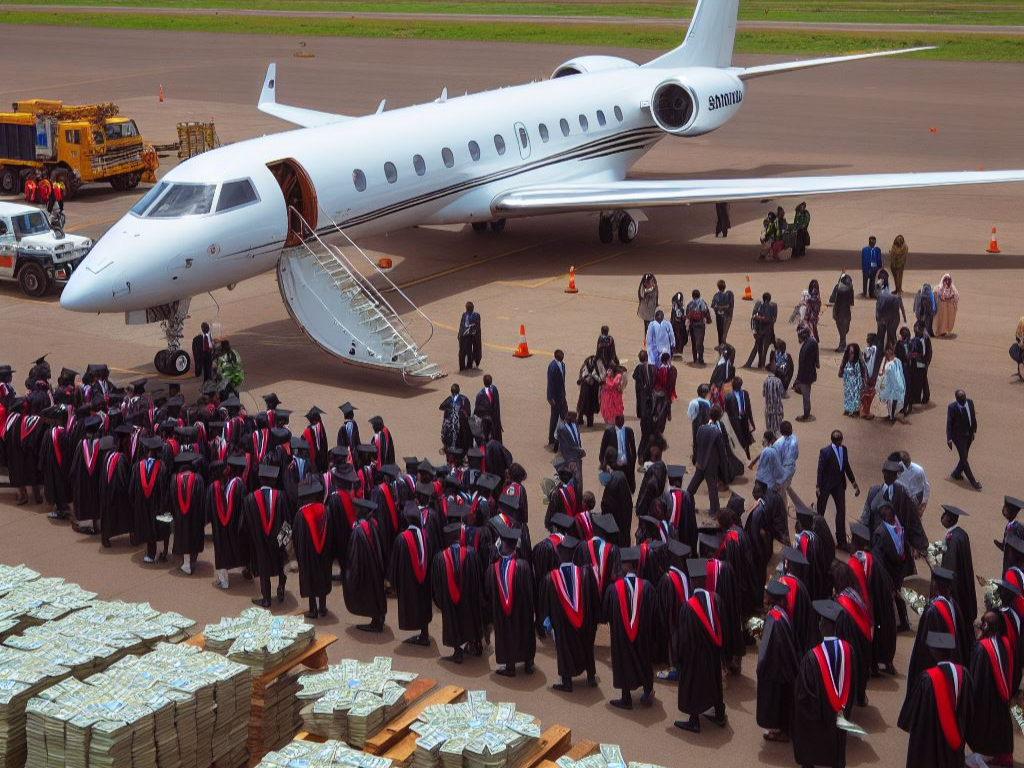Higher education throws government another ball to juggle
The president's trip to the US was this week's main event as Kenyans waited to see what he and his entourage would bring back home. However, while the Head of State was away, there was time to tally how much his trip would cost tax payers and teachers on strike added an entry to the government's long 2024 to-do list.
Here are the main stories in education this week:
- Nationwide schools' census begins
- JSS intern teachers strike continues
- Government stand on feeding program opposed
In this edition
SPOTLIGHT: From America with billions
HEADLINES: Top 3 stories in Education this week
INSIGHT: More students into more teachers
PAUSE: This Week In: Public Health
NEWS: More stories in Education this week
QUICK: Other stories worth a mention
REGION: Top stories across the region in Education
EXTRA: A book recommendation for educators from Bill Gates
SPOTLIGHT
From America with billions

Kenya’s education sector is set to receive nearly $32 million (Sh4.2 billion) of investment from the US to support new partnerships between the two countries’ universities and industry. This is in a bid to drive innovation, research and job growth in Science, Technology, Engineering and Mathematics (STEM) related fields in the country. The funding announcement was made during the strategic partnership signing event in Atlanta, USA, during President William Ruto’s four-day US visit.
The arrangement is under the Framework for Cooperation between universities and industry “to drive innovation, research and job growth in STEM-related fields in Kenya and globally,” according to a dispatch on Tuesday.
This framework is expected to foster linkages, partnerships, exchange programs, and other relationships aimed at developing the STEM capacities of Kenyan higher education institutions, as well as advancing advanced manufacturing and ICT sectors.
"I am delighted that today, inspired by the initial Mboya/Kennedy airlift and determined to foster future skills, Kenyan universities and their counterparts will sign a framework agreement to enhance student and faculty exchange, joint research, and innovation, aiming to bolster capabilities for a digital future. Kenya stands ready to maintain its vanguard role, furthering our ambition to accelerate the Silicon Savannah." –President William Ruto
Sh3.234 billion will be allocated to a program focusing on early-grade literacy, ensuring that more Kenyans possess foundational skills necessary for higher education success. Additionally, Sh858 million will support a new project connecting Science Technology, Engineering, and Mathematics (STEM), graduates with employment opportunities in rapidly growing sectors like ICT, textiles, and pharmaceuticals.
The head of state highlighted the STEM Mentorship Programme, implemented by UNESCO in collaboration with the Government of Kenya, has benefitted 2,000 young women, adding that it serves as a model for the power of partnership. Ruto said Kenya will leverage the Kenya-US partnership to empower and inspire greater female participation and leadership in STEM.
The partnership is a big win for higher education in the country, a sector that continues to need more investment. The onus now lies with the Government in smoothly implementing the said initiatives and putting these opportunities to use.
HEADLINES
The week's main stories
- Nationwide schools' census begins. The Ministry of Education has launched a 50-day nationwide survey for basic education institutions in Kenya. "The purpose of the school census is clear: to gather accurate and comprehensive data about our students, teachers, infrastructure, and resources," said PS Belio Kipsang'.
- JSS intern teachers strike continues. As the Junior Secondary School (JSS) intern teachers' strike entered the second week, demonstrations continued with the interns demanding permanent & pensionable employment. The 46,000 teachers, who are currently serving on contract terms, have paralysed learning in JSS classes in a bid to push the Teachers Service Commission (TSC) to confirm their employment.
- Government's stand on feeding program opposed. The parliamentary committee on National Government Constituency Development Fund (NG-CDF) has opposed the government's plan to scrap the school feeding programme which feeds over 2.6 million learners in over 26 counties. In Nairobi, Governor Johnson Sakaja announced that the implementation of the school feeding programme will continue.
INSIGHT
More students into more teachers

The Kenya Universities and Colleges Central Placement Service (KUCCPS) on Tuesday released student placement results which will see at least 890,654 of the 899,453 candidates who sat for the 2023 Kenya Certificate of Secondary Education placed in universities and colleges.
201,146 (22.5%) students attained a mean grade of C+ and above thus meeting the minimum requirement for placement to degree programmes. The remaining 694,086 (77.5%) attained mean grades of between C and E and are eligible for placement to Diploma, Craft and Artisan programmes in TVET institutions.
KUCCPS offered courses from 70 universities, 35 teacher training colleges, 88 Kenya Medical Training College (KMTC) campuses, and 248 public TVET colleges.
The total approved capacity for training declared by universities and colleges stands at 1,078,806, comprising 278,006 university spots and 769,820 TVET spots. Teacher training colleges have 13,808 spots, and KMTC has 17,172.
A total of 153,301 students have been placed in various degree programmes in universities, accounting for 76.2% of the 201,146 Kenyan students who qualified, according to CS Machogu, with 134,743 set to join public universities and 18,558 opting for private institutions.
A highlight from this year’s placement is that the Bachelor of Arts in Education programme attracted the highest number of applicants. Over 30,000 students applied for the course with the upsurge linked to scrapping Mathematics & English as minimum requirements for the programme.
In line with this, according to the Economic Survey 2024 report released earlier this week, the education industry recorded the highest growth in employment of 10.9 per cent mainly attributable to the large number of teachers hired by the Teachers Service Commission (TSC).
The education industry is a major employer and with the changes in minimum requirements, the increase in applicants pursuing an education degree bodes well from a human resource perspective. However, we can only hope that the perennial wage issues that result in repeated learning disruptions can be resolved in the long term through sound economic policy. Failing this will simply result in a larger number of disgruntled teaching staff leaving learners as the biggest losers.
PAUSE

NEWS
What else we learned
- As heavier-than-usual rains persist in many parts of Kenya, thousands of students affected by flooding remain at home, a week after their peers reported back to school after an extended first-term break. Meanwhile, school heads across the country have been instructed to admit their schools’ learners affected by floods without conditions.
- The government plans to triple enrollment in Technical and Vocational Education Training (TVET) institutions from 350,000 to a million over the next five years, according to new data. This was revealed amid ongoing celebrations marking 100 years since the inception of TVETs in the country.
- The Ministry of Health has issued an advisory to all schools to ensure sanitation as heavy rains continue to be experienced across the country. Eight key actions have been outlined by the ministry, which include evacuation plans that guide all schools on clear evacuation routes, and warning signals.
QUICK
One-liners
- NACADA bans billboards promoting alcohol near schools [Read]
- State releases Ksh1.5B for various groups, needy students [Read]
- Govt initiates KES 2.5bn push to shift to cooking gas in public schools [Read]
- Student numbers at private varsities fall on State funding drought [Read]
- Parents storm Shimo la Tewa High School & demand Principal is transferred [Read]
REGION
What's happening next door?
[UG] Govt passes early childhood development policy: The policy is expected to, among others, provide for the care and education of children aged below five years. Under the policy, regulation of ECD care and education will lie on the shoulders of the Government, while the provision of education will largely be left to non-state actors, including private persons & faith-based organizations.[Read]
[UG] Makerere University on road to adopting blended learning: The institution has enhanced capacity building to support students’ blended teaching and learning. To realize the university’s ultimate goal of having an effective Open Distance and e-Learning (ODeL) environment, institution management has recently acquired new hardware.[Read]
[TZ] Exim Bank Tanzania launches payment platform for school tuition: The ‘Exim Smart Shule,’ platform is intended to accelerate the adoption of digital technology in the education sector. It utilises a system-generated control number and allows payments through bank branches, agents and mobile phone networks. [Read]
[TZ] Govt orders all dropouts returned to school: Prime Minister Kassim Majaliwa has instructed Regional Commissioners, councils and education quality controllers countrywide to monitor all children who dropped out of school and ensure they resume classes. The instructions came following a question from a Skonge MP, Joseph Kakunda, who sought to know the government’s strategies for controlling the problem. [Read]
EXTRA
A book recommendation for educators from Bill Gates
Bill Gates’s latest book recommendation is about the intersection between AI and education. The book is titled “Brave New Words: How AI Will Revolutionize Education (and Why That’s a Good Thing)” by Salman Khan, the founder & CEO of Khan Academy.
If you're passionate about education, you need to read this book. Sal offers a compelling vision for harnessing AI to expand opportunity for all. https://t.co/5QwCp1ar0G
— Bill Gates (@BillGates) May 14, 2024
The book charts how advances in AI will transform education and offers a guidebook for teachers, parents, and students to navigate changes in this "new world," the book description reads.
Gates has been optimistic about AI's role in education. In a letter published last year, one of his predictions was that in the next five to 10 years, AI could start delivering educational content tailored to a student's learning style.
Education stakeholders, take heed.
That brings a pause to an action-packed week in education. We hope you found this edition informative. Please share any feedback as we continue to shape "This Week In: Education".
